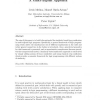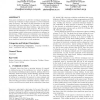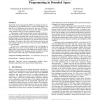119 search results - page 12 / 24 » Classical Linear Logic of Implications |
EUSFLAT
2001
13 years 9 months ago
2001
The aim of this paper is to build a formal model for similarity-based fuzzy unification in multi-adjoint logic programs. Specifically, a general framework of logic programming whi...
SIAMCOMP
2012
11 years 10 months ago
2012
Abstract. In the framework of Carter and Wegman, a k-independent hash function maps any k keys independently. It is known that 5independent hashing provides good expected performan...
APAL
2002
13 years 7 months ago
2002
The paper introduces a semantics for the language of classical first order logic supplemented with the additional operators and . This semantics understands formulas as tasks. An ...
PPDP
2004
Springer
14 years 28 days ago
2004
Springer
Semi-naive evaluation is an effective technique employed in bottom-up evaluation of logic programs to avoid redundant joins of answers. The impact of this technique on top-down e...
POPL
2012
ACM
12 years 3 months ago
2012
ACM
Functional reactive programming (FRP) is an elegant and successful approach to programming reactive systems declaratively. The high levels of abstraction and expressivity that mak...



